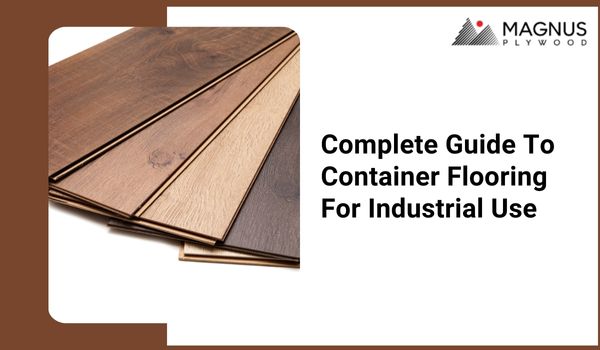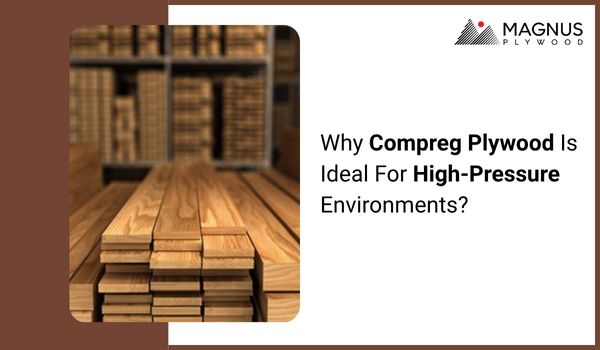One material that stands out for ensuring safety, durability and efficiency for your industrial use is the container flooring. However, when it comes to choosing transport plywood for cargo containers, chequered plywood for slip-resistant performance, and bus flooring plywood for passenger comfort, discovering the ideal material is highly essential.
This is because each flooring type has its strengths, making it inevitable to understand which option best suits your specific industrial needs. In this short guide, today, we will be covering everything about container flooring.
From why container flooring matters to how to choose the ideal flooring that matches your needs. Without wasting more time, quickly dive into this instant guide and effortlessly pick your container flooring that complies with your needs.
Why is Container Flooring Ideal for Industrial Use?
Container flooring, be it your transport plywood, chequered plywood, or truck flooring plywood, plays a key role not only in supporting heavy loads but also in ensuring workers’ safety during transportation. Below, we have mentioned some of the most common reasons why container flooring plays a major role in the industry sector.
1. Superior Strength with High Load-Bearing Capacity
The industrial sector mostly involves transporting or storing heavy machinery, stacked goods, or bulky cargo. Container flooring, be it your transport and truck flooring plywood is designed to withstand significant weight without warping or cracking. This offers the highest structural integrity over the years, even under constant heavy load conditions.
2. Full Safety with its Anti-Slip and Stable Texture
The next reason why container flooring, be it transport plywood or truck flooring plywood, is ideal for industrial use is its enhanced safety features. Industrial environments require constant movement of the workers. This calls for extra safety in the workplace.
For example, chequered plywood is one of the most popular types of plywood that is designed with a textured, slip-resistant surface. This drastically reduces the chances of accidents in wet environments, making it the right choice for high-traffic areas or projects, where stability plays a key role in cargo as well as in personnel.
3. Matches every Industrial Need
Container flooring is a popular type of transport plywood that offers complete versatility. For instance, you can choose bus flooring plywood for your commercial buses. You can consider truck plywood for your cargo needs.
In short, whether you pick any variant of container plywood, be it your chequered plywood or truck flooring, you can adjust it to fit different industrial requirements. This gives you complete freedom to choose the ideal plywood that not only matches your needs but also offers extreme durability.
How to Pick the Right Container Flooring for your Industrial Needs?
Whether you are transporting cargo, ensuring passenger safety, or storing heavy machinery, here are the top five factors you should consider while choosing the right transport plywood.
1. Analysing the Load Requirements
Before you pick the right chequered plywood or transport plywood, always understand how much weight your flooring is required to handle. For instance, if you want a material that can handle heavy and tough loads, you should opt for transport plywood and truck flooring plywood.
These materials are the right choice for the logistics and construction industries. Conversely, bus flooring plywood works well for passenger buses. This material offers complete comfort for longer journeys.
2. Consider Safety Standards
Considering safety standards is also essential while choosing the ideal transport plywood. For instance, if your industrial operations involve constant movement of goods or people, slip resistance becomes critical.
In this scenario, choosing chequered plywood can be the right choice. This material reflects a textured surface that minimises the risk of slipping. Thus, making it ideal for ensuring both worker safety and the safe handling of goods.
3. Evaluate Environmental Conditions
Another essential factor you should consider while deciding on truck flooring plywood, or chequered plywood is to evaluate the environmental conditions. The environment in which your container will operate plays a big role in choosing the flooring. Such as if you are looking for container flooring that suits humid environments, always consider plywood that offers the highest resistance to moisture.
On the other hand, if your containers are constantly placed in the toughest environments, you can consider container flooring that can handle expansion as well as contraction.
4. Matching Flooring to Industry Applications
Different industries have different needs; choosing the right transport plywood that complies with the specific needs is crucial. For example, the transport plywood works well for heavy cargo. On the other hand, bus flooring plywood is designed for smooth rides and passenger safety.
Similarly, chequered plywood, being one of the popular materials, is built with an anti-slip surface, making it ideal for offering the highest performance in both industrial and public transport settings.
5. Balance Quality and Cost
Balancing quality and cost is the fifth factor that requires careful consideration while picking the right container flooring. While it might be tempting to choose inexpensive container flooring. However, lower-quality transport plywood can lead to frequent repairs and replacements.
So, make a habit of putting your money on premium and high-quality plywood. This will save your money from frequent maintenance, expensive installation and quick replacement in the long run.
Tips for Caring and Maintaining your Container Flooring
Now that you are aware of why container flooring is essential and how to choose the right one, let us learn the simplest care and maintenance tips that will help you extend its lifespan, maintain its strength, and keep it looking as good as new.
1. Regular Cleaning and Debris Removal
Consider regular cleaning of the container flooring to remove any dust or debris. Whether you are buying chequered plywood or bus flooring plywood, keeping it clean is essential. Dust and debris accumulate in the long run, thus causing scratches, surface wear and tear. This makes regular sweeping and occasional mopping with a mild cleaning solution inevitable, protecting your plywood’s finish.
2. Prevent Moisture and Water Damage
The next caring tip for your container flooring is to prevent moisture and water damage. Though all flooring, be it truck flooring plywood, or bus flooring plywood is built to be waterproof. Constant exposure can weaken its performance and durability. Hence, always check for leaks in the container roof or walls and fix them immediately.
For example, if you are considering container flooring in humid areas, always apply a water-resistant sealant to your flooring. This will act as a protective layer, thus saving your plywood from warping, swelling, or rotting caused due to challenging weather conditions.
3. Inspecting and Repairing the Damage Promptly
It is seen that every heavy industrial plywood is prone to dents, scratches, or cracks over time. Ignoring these small damages can lead to larger issues that compromise safety and performance. Hence, always check your flooring at regular intervals.
Especially if you have placed your container flooring that carries heavy loads or suffers frequent seasonal changes, this becomes more important. If you find any minor damage, consider repairing, if you find any major damage, consider replacing. This will prevent extreme deterioration, thus saving you from costly replacements in the future.
Final Words
In essence, from the above, it is clear that container flooring is not simply about deciding on the base for your industrial operations. It lays the foundation for ensuring the highest safety, durability, and efficiency. Be it discovering the transport plywood for cargo transportation to finding chequered plywood that offers slip-resistant performance, ensuring you are picking the right container flooring is highly inevitable for enjoying maximum reliability.
The above guide might have helped you a lot. It covers everything from how to pick the right container flooring that suits your needs to effective care and maintenance tips. By following the above factors, you can confidently make an informed decision that meets your operational needs.
Planning to upgrade your industrial setup with superior flooring materials? Book a call now and effortlessly connect with our team, who will help you choose the right flooring solution that complies with every industrial need.
FAQs
1. What is container flooring in industrial applications?
Ans. Container flooring is a popular type of plywood that is designed to bear heavy loads, prevent damage to the cargo and offer full safety for the workers. In simple words, container flooring, be it your chequered plywood or bus flooring plywood, is a strong, durable base that is built-in into industrial shipping or storage containers to offer the highest durability.
2. Which materials are best for industrial container flooring?
Ans. Various materials are best suited for industrial container flooring. Some of the most common ones include transport plywood, chequered plywood, phenolic-coated plywood, and marine plywood.
3. What is the standard thickness of container flooring for heavy loads?
Ans. 28mm to 30mm is the standard thickness of container flooring for heavy loads. This thickness of plywood offers the right load-bearing capacity and doesn’t warp or bend easily.
4. What are the benefits of using phenolic-coated plywood in containers?
Ans. From offering superior water resistance capability, exceptional chemical resistance to long-lasting durability and performance, there are various benefits of using phenolic-coated plywood in industrial use containers.
5. How to choose the right flooring for shipping or storage containers?
Ans. Ideal container flooring that matches your shipping and storage requirements, calls for considering several factors. Some of the most important factors you should consider include evaluating your load requirements, safety needs, environmental conditions, and specific industry applications while balancing quality and cost. Considering these factors will ensure optimal performance and longevity.



